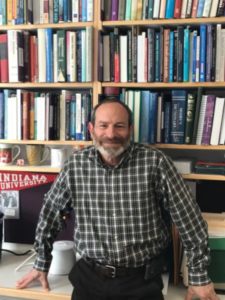
Dr. David Shapiro. Photo by Jesse Pigeon
A WCU professor who once experienced stuttering is now helping the world by not only showing his students how to help with communication and speech disorders but is teaching a universal lesson of unity and passion.
David Shapiro has not only enriched the young minds of Western Carolina University for 33 years but has also been distinguished for his contributions to the field of fluency and voice disorders.
Shapiro, Ph.D., CCC-SLP, is a very decorated educator. Shapiro who is a Robert Lee Madison Distinguished Professor and a Fellow of the American Speech-Language-Hearing Association.
Even with such distinction, Shapiro remains a humble family man, spreading his powerful message to as many as he can
Shapiro is not only an experienced clinician but a man who has experienced stuttering first hand. He set out one main goal for himself – if he were to overcome his disability, then he would help others do the same.
It’s safe to say he has not only accomplished his original objective but has also found within himself a burning passion for his work and those with whom he works.
Shapiro wants to use his story as a way to bring people together, “weaving this story that connects people, from local to global.” During his many years of service to the field of fluency disorders, he has collected numerous experiences and stories that resulted in one major message – unity can be found within common interests.
Shapiro has discovered that, when people choose to focus on a common interest, there is nothing they cannot accomplish together.
He believes that this message should be taken to a much larger scale – that when we choose to realize how similar people are, and that differences are merely just “value added,” we have realized the best of human potential.
To verify this statement, Shapiro noted his time spent with a fellow speech-language pathologist who is from the Czech Republic and spoke no English. While their speech was limited to cross-translation, there still grew a sense of fondness between them. He recalls that she would pat his beard and talk to him in Czech, and that, no matter their amount of differences, he was treated as part of the family even though the only thing they have in common is what they do for a living.
Another important message Shapiro wants to give is directed at individuals who stutter.
Shapiro wants people to know that “they are not alone and there is hope for people who stutter, and that there are people who understand, and help is available.”
He also noted that he would welcome anyone who wished to speak to him personally, or suggested that they contact the WCU Speech and Hearing Clinic located in the Health and Human Sciences building.
As a passionate clinician and individual, it leaves little to the imagination as to what kind of professor Shapiro is. His hope for the future generation of clinicians is remarkable, and all under his tutelage can feel his inspiration. He believes his students must care now, commit now and grow their passion.
Abbie Bradshaw, an undergraduate communication sciences and disorders major at WCU commented, “I’ve only known him for a short time, but I can see how deeply passionate he is for this field of work. After listening to his experiences, it’s almost impossible not to care, not to want to do your best and make great strides in improving this field. I think many of us students can only hope to one day be as passionate as Dr. Shapiro.”
Humble, passionate and inspiring are all adjectives that are frequently attached to Shapiro’s name. He isn’t someone who wants to be known for the accomplishments and awards he has, but rather wants to spread a deeper and more meaningful message of unity, and to impassion the future generations of clinicians, for they are the “servants of tomorrow.”


